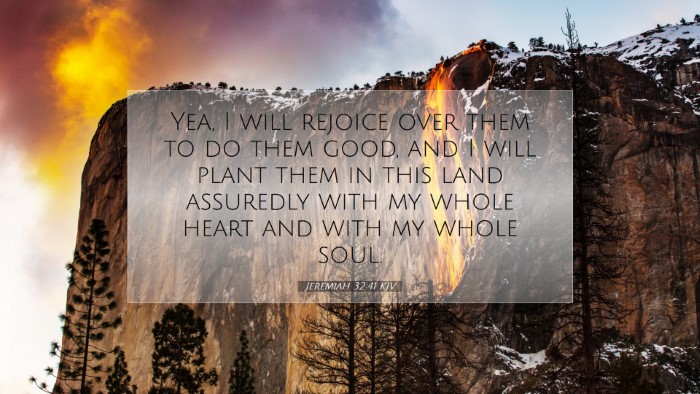Commentary on Jeremiah 32:41
Verse Context: Jeremiah 32:41 reads, “Yes, I will rejoice over them to do them good, and I will plant them in this land assuredly with my whole heart and with my whole soul.” This message comes during a time of despair for the people of Judah, as they face impending exile and destruction of the city of Jerusalem.
Overview:
This verse emphasizes God's steadfast love and commitment to His people despite their sins. In the midst of judgment, God declares His intentions for restoration. This duality of judgment and mercy is central to the prophetic message of Jeremiah, and it offers deep insights for believers today.
Insights from Commentaries
Matthew Henry's Commentary:
Matthew Henry notes that God's assurance of joy in doing good to His people emphasizes divine benevolence. He asserts that the phrase “I will rejoice” reveals God’s emotional involvement in the covenant relationship: He delights in the salvation of His people.
- Joy in Restoration: Henry highlights that God’s plan for joy comes from a place of deep compassion, indicating that His pleasure is found in the wellbeing of His people.
- Faithfulness to the Covenant: The promise to “plant them” signifies God’s faithfulness to His covenant. It symbolizes not just physical restoration, but spiritual and relational renewal with Israel.
Albert Barnes' Exposition:
Albert Barnes emphasizes the certainty and depth of God's promises, focusing on the phrases “with my whole heart and with my whole soul”. Barnes interprets this to mean that God’s commitment to His people is total, reflecting His unshakeable love.
- Divine Commitment: The use of “heart” and “soul” illustrates the comprehensive nature of God’s intentions towards His people, indicating that His involvement is not merely functional but deeply relational.
- Future Hope: Barnes indicates that this promise provides theological hope, framing God’s actions as purposeful and filled with intention, moving towards an ultimate good for the people of Israel.
Adam Clarke's Commentary:
Adam Clarke offers a nuanced interpretation that underscores God’s sovereignty in salvation as well as His desire for a covenant relationship. Clarke notes that the promise to rejoice in doing good reflects God's nature as generous and benevolent.
- God's Sovereignty and Human Response: Clarke discusses the importance of recognizing God’s sovereignty over the circumstances surrounding Israel. Despite their unfaithfulness, God remains dedicated to bringing about goodness in their lives.
- Divine Gardening: The metaphor of planting suggests care, cultivation, and growth, indicating that God is actively involved in nurturing His people back to a state of health and prosperity.
Theological Themes:
- Judgment and Grace: This passage emphasizes that while God will judge unfaithfulness, His ultimate desire is to restore and redeem, reflecting a consistent biblical theme of grace overcoming sin.
- Hope and Restoration: The promise made here speaks to the importance of hope amidst despair. Pastors and theologians can apply this message in contexts where individuals or communities face turmoil.
- Divine Joy in Covenant Relationship: God’s emotional investment in His people serves as a reminder of the relational aspects of faith, urging believers to recognize the depth of God's love and commitment.
Application for Today:
As pastors, students, and theologians reflect on Jeremiah 32:41, several applications emerge:
- Encouragement in Trials: This verse serves as a reminder that God’s plans are for good, providing comfort during periods of hardship and uncertainty.
- Call to Repentance: The Jewish people were facing consequences due to their unfaithfulness. This serves as a call for contemporary believers to remain steadfast in their relationship with the Lord.
- Emphasizing God’s Love: Understanding God's joy in restoring His people can help believers grasp the enormity of divine love and mercy.
- Fostering a Community of Hope: Communities of faith are encouraged to embody hope and celebrate God’s goodness, thereby reflecting the very nature of God expressed in this passage.


